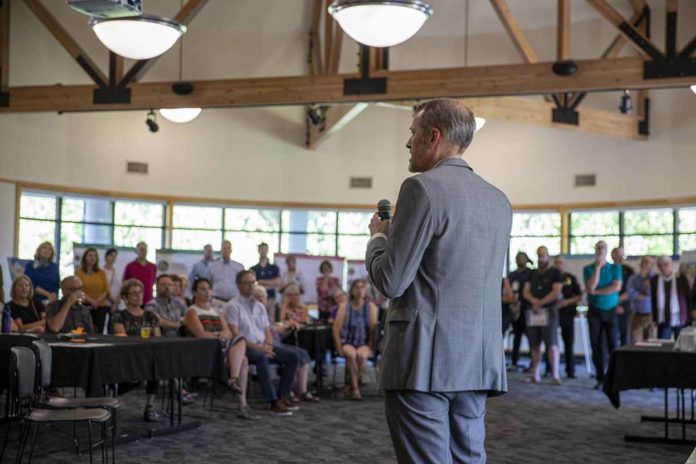
The third and final open house for A Stronger Vancouver saw high community turnout at the Water Resource and Education Center last week. Community leaders welcomed public input, and now move into the decision making process.
A presentation by Vancouver City Manager Eric Holmes preceded an interactive time with posters and representatives from each proposed project to answer questions. Attendees ranked projects through a sticker voting system, and a coin-and-bucket tally.
The presentation addressed updates in several project proposals, as well as a general overview of what the leading capital projects are. More than 35 proposed projects and more than 25 programs cumulate into a cost of $292.9 million if all were completed, according to documents distributed at the event.
“At the foundation of this effort is really a long-term vision for the city of Vancouver,” Holmes said. “As we look at where we want to be 10 years from now, in 2030, the community’s vision really is … first and foremost, being welcoming; a welcoming place for all who choose to make Vancouver home. Part of that, is really making sure we have improved affordability.”
In April, the team for A Stronger Vancouver presented tax increases of $30.1 million in their revenue package to City Council members and the city. The revenue would be derived from a series of tax and fee increases from year to year; each totaling over $30 million.
These increases would likely come in the form of property taxes, a B&O tax and utility tax rates; the property tax raising an estimated $9.7 million annually, and the utility coming $3 million annually.
The goal is to gauge community interest so as to accelerate and complete only the projects most important to the communities they impact. Focus areas of West, East and Central Vancouver have been outlined for this purpose.
Among the largest capital projects are the replacement of the maintenance and operation center, commercial district infrastructure improvements, replacement of fire stations three and six, creation of new Fenton Park and a redesign of Marine Park.
Large amounts of updates and support is also proposed for law enforcement, rapid response rescue units, homelessness services, business district development and traffic/pedestrian safety improvements. The city currently has a pedestrian collision rate that is twice the state average, according to Holmes.
Private citizens as well as business representatives attended the open house, most with positive comments on the public opinion gathering process.
“I’m really impressed with the recitation. It makes it really understandable. It’s very clear,” said Vancouver resident Sue Pupo. “Especially the funding side, because that hasn’t been addressed at anything that I’ve been to before. Who’s going to pay for it, and I mean, I know we all do, but to prioritize it.”
Others attended in representation of their neighborhood or business, and wanted to collect as much information to take back with them as possible.
“The way it’s moving looks encouraging. It looks like they’re trying to spend money in the right places,” said Central Park neighborhood President Jim Thomas. “The only question I might have is, I saw they were talking about more jobs and it’s like, ‘Well isn’t more jobs going to move more people in and exacerbate the housing problem.’ I’m sure they’re looking at that too.”
Several newer businesses had employees or representatives present, and many saw it as a way to better connect with the community and be in touch with what is happening.
“We thought it was a great opportunity to learn about the community and our priorities,” said Jon Sze of WRK Engineers. “I’m just surprised that there were so many things going on. I didn’t even know about it.”
“I wanted to know what the community thought about all these different areas that we can improve, and how it may affect us and our work,” said Micahel Weiss, also of WRK Engineers. “We’re building engineers, and we want to see what residents and community members think about the changes that could eventually happen.”
Moving forward, the group plans to hold several multilingual meetings, focus groups and a large scale community survey, all of which will be presented to council, Holmes said. Input on the projects is also being accepted online until Sept. 15.
Holmes said the group is currently expecting a final decision addressing which capital projects will be initiated and what the payment method will be, from City Council in November or December of 2019.



